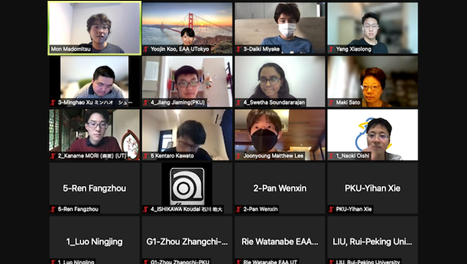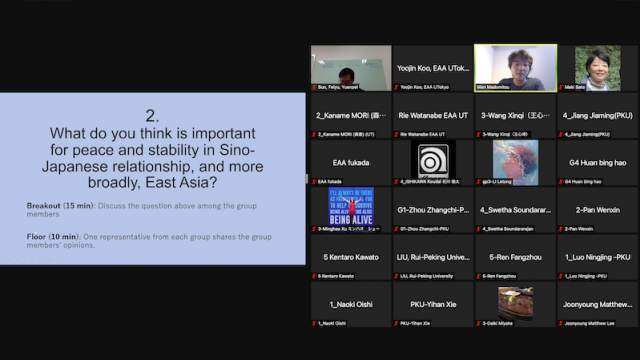While the world continues to struggle with the coronavirus pandemic and seeking a way out of the crisis, the East Asian Academy was once again able to hold the Summer Institute 2021 by connecting Peking University and University of Tokyo students. The pre-sessions on “Day 0” started with an icebreaker. This year, Mon Madomitsu joined as a special student organizer and chaired the icebreaker, which provided a much more comfortable atmosphere for student participants and encouraged them to engage more in the interactions and discussion.
For the first half of the icebreaker, Madomitsu suggested a breakout room session in the preassigned groups and asked participants to introduce the fellow members of their group instead of themselves. This approach worked well and many of participants then felt relaxed enough to turn their camera on.

For the second half of the day, Madomitsu took the conversations a bit deeper by raising the following topic: What do you think is important for peace and stability in Sino-Japanese relations and, more broadly, East Asia?

Each group delved without hesitation into the topic and then shared what they had discussed when everyone came back together at the end.
Group One opened the floor by sharing their discussion on the deterioration of Sino-Japanese relations in recent years, especially due to the pandemic, the media, and the information technology we rely on for communication, and noted the modest progress made through such endeavors as the Summer Institute 2021.
Group Two suggested that we should observe of Sino-Japanese relations at different levels: official and unofficial. Though hostile conversations occur repeatedly at the official level, we can protect unofficial interactions and strengthen ties there to boost the bottom-up forces that can make a positive change at the official level.
Group Three also took this approach of looking at the private and public phases of Sino-Japanese relations. We can enjoy cultural exchange of animation, films, and music at the private level, and deepen our conversation based on the things we have in common, such as Buddhism. Not everything needs to be political.
Group Four stressed mutual understanding without prejudice. In order to achieve this, the right atmosphere in society is crucial, and education can be a solution to untangle the problem.
Group Five brought up the importance of East Asian triangular—namely Chinese-Japanese-South Korean—cooperation. Given the dynamics of US hegemony in the region, we need to seek more ties in terms of culture and education as well as institutions and economics.
These discussions not only broke the ice but also warmed us up for the following two days of conversations. As with many events expected to be held in-person this autumn that had to change to online/virtual formats due to the recent surge in new Covid cases, we were worried about the impact on the quality of the event. Nonetheless, the interaction and sense of connection among students were not hindered by the communication tools. The success of the pre-sessions raised our expectations for the two days of the Summer Institute 2021 that lay ahead.
Reported by Yoojin Koo (EAA Project Assistant Professor)








